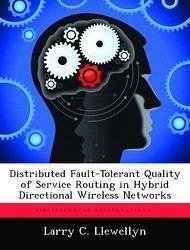Nicht lieferbar

Distributed Fault-Tolerant Quality of Service Routing in Hybrid Directional Wireless Networks
Versandkostenfrei!
Nicht lieferbar
A hybrid mobile ad hoc network (H-MANET) consists of a group of communicating hosts that form an arbitrary network topology by means of any of several wireless communication media - E.g., free space optics (i.e., infrared laser light), or directional radio frequency technology. H-MANET communications represent a diversification in communication technology necessary to solve the stringent end-to-end requirements of the GIG. Of the many challenges in this complex distributed system, the problem of routing based on a predefined set of customer preferences, critical to guaranteeing quality-of-serv...
A hybrid mobile ad hoc network (H-MANET) consists of a group of communicating hosts that form an arbitrary network topology by means of any of several wireless communication media - E.g., free space optics (i.e., infrared laser light), or directional radio frequency technology. H-MANET communications represent a diversification in communication technology necessary to solve the stringent end-to-end requirements of the GIG. Of the many challenges in this complex distributed system, the problem of routing based on a predefined set of customer preferences, critical to guaranteeing quality-of-service, is the focus of this research. Specifically, this thesis modifies a cluster based QoS routing algorithm for mobile ad hoc networks with the aim of providing fault-tolerance - a critical feature in providing QoS in the link failure prone environment of mobile networks. Performance of this new fault-tolerant cluster based QoS wireless algorithm is evaluated according to failure recovery time, dropped packets, throughput, and sustained flow bandwidth via simulations involving various node failure scenarios along QoS paths.





